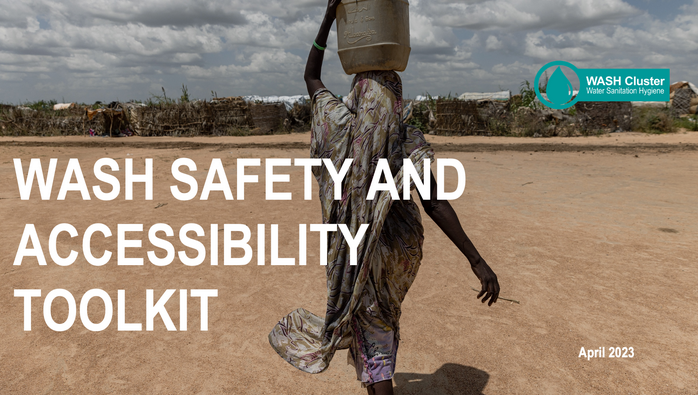toolkit
Wash Safety and Accessibility Toolkit
Year: 2024
Publisher: Global WASH Cluster
This safety and accessibility rapid audit tool is based on visual observation as a means to collect basic information and assess gender-based violence (GBV) risks and accessibility related issues on the route to, while entering and using WASH facilities. It is a structured method for collecting data and information that will support the WASH sector in 1) Assessing GBV risks related to the design, layout, placement of WASH facilities; and 2) Checking if WASH infrastructures are accessible to persons with disabilities in line with the WASH commitments to ensure at least 15% of WASH facilities are accessible.
Wash Safety and Accessibility Toolkit
External Link
Open linkRating
Would you like to see other resources here?
Give us your feedback"*" indicates required fields
Related Resources and Tools
Humanitarian Aid Solid Waste Assessment and Improvement (HAWAI) Guidelines
The Humanitarian Aid Solid Waste Assessment and Improvement (HAWAI) Guidelines are designed to support effective Solid…
Planning for Zero-Waste at Schools - A Toolkit
This toolkit aims at providing step-by-step guidance accompanied by tools to develop and implement “Action…
Gender In Emergencies Standards
Oxfam’s 2022 Gender in Emergencies (GiE) Standards are the key internal tool by which we…
Biogas Technology Evaluation Tool
An Excel-based calculation tool that can be used in conjunction with the guide “Is biogas…
Monthly OPEX, Lime Stabilisation Pond
Monthly OPEX Anaerobic Baffled Reactor
An approach to transforming pit latrines into on-site faecal sludge treatment facilities
Video from the presentation at the Emergency Environmental Health Forum (EEHF) 2025 by Bara Wahbeh…
Oxfam Gender In Emergencies Standards
Oxfam’s 2022 Gender in Emergencies (GiE) Standards are the key internal tool by which we…
Gender Equality and Social Inclusion Self-Assessment Tool
This guidance is for staff of water, sanitation and hygiene (WASH) implementation and research projectsand…
WASH for Peace Guidance and Tools
Integrating conflict sensitivity and peacebuilding approaches to WASH programming in fragile and conflict-affected contexts Despite…
The IASC Gender With Age Marker
The IASC Gender with Age Marker (GAM) helps users to design and implement inclusive programs…
Violence, Gender and Wash: A Practitioner’s Toolkit – Making Water, Sanitation and Hygiene Safer Through Improved Programming and Services’
This toolkit has been developed in response to an acknowledgement that although the lack of…
Water and Conflict: A Toolkit for Programming
This practical toolkit explains the connection between water management and key risk factors associated with…
Technical Brief: Climate Resilient Sanitation in Practice
Climate change is drastically changing the world we live in. It devastates lives, causes changes…
WASH Safety and Accessibility Toolkit
This toolkit is designed to provide practical monitoring mechanisms to track the quality and safety…
Humanitarian Aid Solid Waste Assessment and Improvement (HAWAI) Guidelines
The Humanitarian Aid Solid Waste Assessment and Improvement (HAWAI) Guidelines are designed to support effective Solid…
Planning for Zero-Waste at Schools - A Toolkit
This toolkit aims at providing step-by-step guidance accompanied by tools to develop and implement “Action…
Gender In Emergencies Standards
Oxfam’s 2022 Gender in Emergencies (GiE) Standards are the key internal tool by which we…
Biogas Technology Evaluation Tool
An Excel-based calculation tool that can be used in conjunction with the guide “Is biogas…
Monthly OPEX, Lime Stabilisation Pond
Monthly OPEX Anaerobic Baffled Reactor
An approach to transforming pit latrines into on-site faecal sludge treatment facilities
Video from the presentation at the Emergency Environmental Health Forum (EEHF) 2025 by Bara Wahbeh…
Oxfam Gender In Emergencies Standards
Oxfam’s 2022 Gender in Emergencies (GiE) Standards are the key internal tool by which we…
Gender Equality and Social Inclusion Self-Assessment Tool
This guidance is for staff of water, sanitation and hygiene (WASH) implementation and research projectsand…
WASH for Peace Guidance and Tools
Integrating conflict sensitivity and peacebuilding approaches to WASH programming in fragile and conflict-affected contexts Despite…
The IASC Gender With Age Marker
The IASC Gender with Age Marker (GAM) helps users to design and implement inclusive programs…
Violence, Gender and Wash: A Practitioner’s Toolkit – Making Water, Sanitation and Hygiene Safer Through Improved Programming and Services’
This toolkit has been developed in response to an acknowledgement that although the lack of…
Water and Conflict: A Toolkit for Programming
This practical toolkit explains the connection between water management and key risk factors associated with…
Technical Brief: Climate Resilient Sanitation in Practice
Climate change is drastically changing the world we live in. It devastates lives, causes changes…
WASH Safety and Accessibility Toolkit
This toolkit is designed to provide practical monitoring mechanisms to track the quality and safety…
Still have questions?
You could not find the information you were looking for? Please contact our helpdesk team of experts for direct and individual support.


